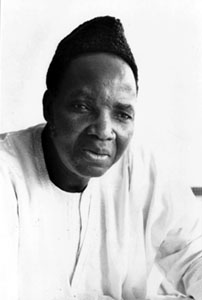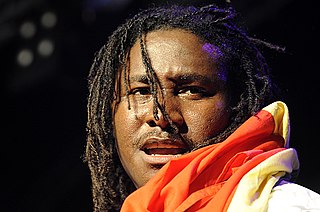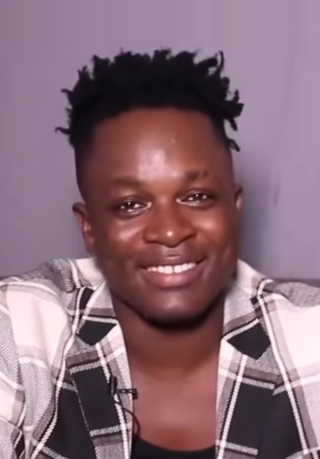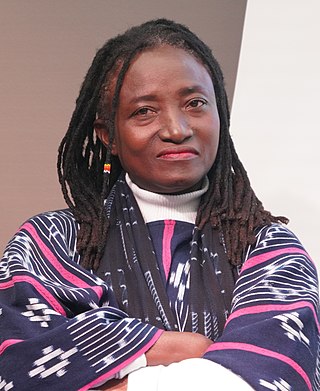Related Research Articles

Burkina Faso is a landlocked country in West Africa, bordered by Mali to the northwest, Niger to the northeast, Benin to the southeast, Togo and Ghana to the south, and Ivory Coast to the southwest. It covers an area of 274,223 km2. In 2021, the country had an estimated population of approximately 23,674,480. Previously called the Republic of Upper Volta (1958–1984), it was renamed Burkina Faso by former president Thomas Sankara. Its citizens are known as Burkinabè, and its capital and largest city is Ouagadougou.

Ouagadougou or Wagadugu is the capital of Burkina Faso, and the administrative, communications, cultural and economic centre of the nation. It is also the country's largest city, with a population of 2,415,266 in 2019. The city's name is often shortened to Ouaga. The inhabitants are called ouagalais. The spelling of the name Ouagadougou is derived from the French orthography common in former French African colonies.

The music of Burkina Faso includes the folk music of 60 different ethnic groups. The Mossi people, centrally located around the capital, Ouagadougou, account for 40% of the population while, to the south, Gurunsi, Gurma, Dagaaba and Lobi populations, speaking Gur languages closely related to the Mossi language, extend into the coastal states. In the north and east the Fulani of the Sahel preponderate, while in the south and west the Mande languages are common; Samo, Bissa, Bobo, Senufo and Marka. Burkinabé traditional music has continued to thrive and musical output remains quite diverse. Popular music is mostly in French: Burkina Faso has yet to produce a major pan-African success.

Idrissa Ouédraogo was a Burkinabé filmmaker. His work often explored the conflict between rural and city life and tradition and modernity in his native Burkina Faso and elsewhere in Africa. He is best known for his feature film Tilaï, which won the Grand Prix at the 1990 Cannes Film Festival and Samba Traoré (1993), which was nominated for the Silver Bear award at the 43rd Berlin International Film Festival.

The University of Ouagadougou is a university located in Ouagadougou, Burkina Faso. Founded in 1974, it was officially renamed in 2015 as l’Université Ouaga 1 Professeur Ki-Zerbo. The UO consists of seven Training and Research Units (UFR) and one institute. In 1995 a second campus for professional education known as the University Polytechnique of Bobo (UPB) was opened in the city of Bobo Dioulasso A third campus for teacher training/trainers opened in Koudougou in 1996; in 2005, it became the University of Koudougou.

Joseph Ki-Zerbo was a Burkinabé historian, politician and writer. He is recognized as one of Africa's foremost thinkers.

The culture of Burkina Faso in West Africa is also called the Burkinabé culture.
Articles related to Burkina Faso include:

Didier Awadi is a Senegalese rapper and a significant figure in Francophone West African hip hop. As a founding member of Positive Black Soul (PBS) with Duggy Tee, Awadi toured around the world contributing to the international popularity of Hip Hop Galsen. Awadi works as a solo artist, accompanied by his crew PBS Radikal. He participates in the Senegalese music industry through his label, recording studio, and rehearsal space, Studio Sankara. Awadi offers a conscious and revolutionary style of music strengthened by articulated and rooted messages. His motivation and inspiration is grounded in the Burkinabé revolutionary Thomas Sankara's phrase: "Let's dare to invent our future!"
United Artists for African Rap is a collective of 17 hip hop artists coming from ten different countries in West Africa and who are committed to use their voices and music for Africa’s development. With the support of the Non Governmental Organization PLAN International, they are engaged in a public awareness campaign relating to Children’s rights and youth problems. With respect, they realized in 2006 the first ever hip hop musical comedy show “The extraordinary Stories of Poto-Poto Children”.
Gee Bayss is one of the pioneer DJs in West Africa. Member of the group, Pee Froiss, he toured throughout the world with his sure-fire turntablism which had crowds jumping whenever the group was performing. Combining solo projects with international tours of the Pee Froiss, Gee Bayss is actively engaged in transmitting his deejaying art to the younger generations.
Le Balai Citoyen, is a political grassroots movement in Burkina Faso, which was part of the opposition against President Blaise Compaoré. It was co-founded by two musicians, reggae artist Sams’K Le Jah and rapper Serge Bambara ('Smockey') in the Summer of 2013. They organized several protests in early 2014, for example hosting a joint rally with the newly formed Movement of People for Progress, filling a 35,000-capacity sports stadium to its rafters.

Moulaye Dicko, better known by his stage name Dicko Fils, is a Burkinabé musician of Fulɓe origin. He sings and plays the kamale n'goni.

Apolline Traoré is a Burkinabé director, screenwriter, and producer. She is known for films that include Sous la clarté de la lune,Borders, Desrances, and Sira, winner of FESPACO's Étalon d'argent de Yennenga in 2023 and Burkina Faso's entry in the Best International Feature Film category for the 96th Academy Awards.

Émile Ilboudo, better known by his stage name Imilo Lechanceux, is an Ivorian-Burkinabé singer, dancer and DJ. He sings in French, Mòoré and Dyula. Lechanceux's music generally falls under the coupé-décalé and afrobeat genres, and he also occasionally raps on his songs. He has toured in West Africa, Europe, Canada and the United States. Lechanceux is sometimes known by his nickname on songs, Le Fils du Pays.

Odile Sankara is a Burkinabé artist, actress, playwright and director. She is the President of the Récréâtrales and a younger sister to the late revolutionary leader of Burkina Faso, Thomas Sankara.

Burkinabè Rising : the art of resistance in Burkina Faso is a 2018 long documentary film directed and produced by Iara Lee.

Malika Ouattara is a slam poet and musical artist from Burkina Faso, known as "Malika la Slameuse".

An ongoing war and civil conflict between the Government of Burkina Faso and Islamist rebels began in August 2015 and has led to the displacement of over 2 million people and the deaths of at least 10,000 civilians and combatants.
On 26 September 2023, dissidents of the Burkina Faso Armed Forces attempted to overthrow the ruling military junta led by Ibrahim Traoré, which came to power a year earlier.
References
- ↑ Janin, Sylviane (2010). Burkina Faso. Editions Olizane. p. 197. ISBN 978-2-88086-386-9.
- ↑ Afrique Magazine. 269–274 (2008). Groupe Jeune Afrique.
{{cite journal}}: Missing or empty|title=(help) - ↑ Chabasseur, Eglantine (October 31, 2006). "Festival Ouga Hip Hop 2006: 6ème Edition". Radio France Internationale.
- ↑ Chabasseur, Eglantine (October 19, 2009). "Waga Hip Hop 2009: Le festival qui ne dort jamais". RFI.
- ↑ Chabasseur, Eglantine (October 19, 2009). "Waga Hip Hop 2009: Le festival qui ne dort jamais". RFI.